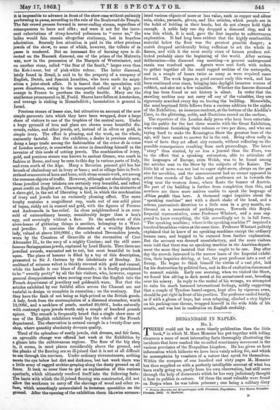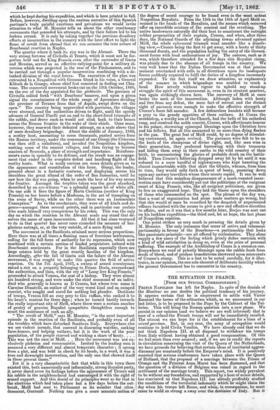BRIGANDAGE IN NAPLES.
No. I.
THERE could not be a more timely publication than the little book,* in which M. Marc Monnier has put together with telling clearness a mass of most interesting facts thoroughly illustrating the incidents that have marked the so-called reactionary movement in the various provinces of the Neapolitan kingdom. He has given us here information which hitherto we have been vainly asking for, and which he accompanies by vouchers of a nature that speak for themselves. Within the compass of one huudred and sixty pages M. Mourner has thus supplied us with a perfectly intelligible account of what has been really going on, partly from his own observation, but still more through the help of documents which he has very judiciously thought it best to publish in extenso. Of these the most valuable were found ou Borjes when he was taken prisoner ; one being a military diary * Notizie Storiche ntt Briqaniaggio neUe Provineie Napolefetne. Per Marco Bonnier. Firenze, 1262. G. Baxbdra,
which he kept during his expedition, and which is here printed in full. Before, however, dwelling upon the curious narrative of this Spanish partizan's truly painful exertions and privations we would invite attention to what M. Monnier tells us about the other reactionary movements that preceded his attempts, and by their failure led to his forlorn errand. It is only by taking together the previous desultory efforts at insurrection in the country with the later effort to light the flame of revolt from abroad that we can measure the true nature of Bourbonist reaction in Naples. The quarter where it took its rise was in the Abruzzi. There the very strong fortress of Civitella di Tronto, which it must not be for- gotten held out for King Francis even after the surrender of Gaeta and Messina, served as an effective rallying-point for a military di- version which was projected in the rear of the Piedmoutese, and to be carried out through a popular insurrection combining with a de- tached division of the royal forces. The execution of the plan was entrusted to a Neapolitan with German blood in his veins, a General Klitsch de la Grange, whose chief feat consisted in finding out Chia- vone. The concerted movement broke out on the 19th October, 1860, on the eve of the day appointed for the plebiscite. The garrison of Civitella sallied forth " with Bourbons' banners, and upon a given signal the mountaineers of the whole range of Apennines dividing the province of Teramo from that of Aquila, swept down on the open." The country being unprovided with garrisons, the villages were stormed, and the authorities driven to flight, until the speedy advance of General Pinelli put an end to the short-lived triumphs of the rabble, and drove such as would not slink back to their homes across the Roman frontier in the wake of their chiefs. Once more, however, they renewed their defeated attempt, on a scale above that of mere desultory brigandage. About the middle of January, 1860, a motley host, amounting to some thousands, pushed across from the Roman territory, under the command of one Giorgi (for Chiavone was then still a subaltern), and invaded the Neapolitan kingdom, sacking some of the nearest villages, and then trying to become masters of Scurcola, a place of strength and importance. Reinforce- ments came in speedily to its defence, and the result was an.engage- ment that ended in the complete defeat and headlong flight of the motley hosts. What is really curious are some details given as to the appearance and constitution of this force. Giorgi, the leader, pranced about in a fantastic costume, and displaying across his shoulders the great riband of the order of San Januarius, until he saw how the day was going, when he made the best of his way across the frontier. Amongst the trophies taken was the great standard, described by an eye-witness "as a splendid square bit of white silk. On one side it bore the figure of Maria Christina (mother of King Francis) on her knees before a Madonna, in the act of trampling on the cross of Savoy, while on the other there was an Immaculate Conception." As to the combatants, they were of all kinds and de- grees—amongst them several priests, and in particular one prelate who made himself very conspicuous by his robes. This was the only day on which the reaction in the Abruzzi made any stand that de- serves the name of open insurrection. All that it has since ventured to do in that quarter has never once exceeded the measure of bur- glarious outrage, or, at the very outside, of a mere flying raid.
The movement in the Basilicata attained more serious proportions. Here there was at all times a floating mass of ferocious lawlessness, calling for the full force of authority for its repression, which now combined with a certain section of landed proprietors imbued with Bourbonist sentiments. For in the Basilicata especially there are large estates held by the great courtly families of the kingdom. Accordingly, qfter the fall of Gaeta and the failure of the Abruzzi movement, it was sought to make this quarter the field of active reaction. On the 7th April, 1861, a swarm of armed countrymen raised a riot on a property belonging to Prince Doria, overpowered the authorities, and then, with the cry of "Long live King Francis," proceeded to attack Venosa, the seat of a bishop. They were almost six hundred strong, and were under the chief command of an indivi- dual who generally is known as Il Crocco, but whose true name is Carmine Donatelli, an outlaw of the very worst kind and an escaped convict, who sought and cared for nothing but plunder. Destitute of troops, Venosa fell an easy prey to this ruffian, who sacked it to his heart's content for three days ; when he turned hastily towards the really important city of Melfi, where there were a certain number of gentry of genuine Royalist sympathies thoughtless enough to court the assistance of such an ally. " The revolt of Melfi," says M. Monnier, "is the most important episode in the reaction of the Basilicata, and probably even of all the troubles which have disturbed Southern Italy. Everywhere else we see •violent inroads, that succeed in disarming watches, sacking farm-houses, and helping outlaws, but it is the work of the poor population, of the people starved and wishing a share of booty. . . . This was not the case at Melfi. . . Here the movement was not ex- clusively plebeian and communistic. Incited by the leading men it assumed a very different and almost temperate character ; it sprang from a plot, and was held in check by its heads, in a word, it was a true and downright insurrection, and the only one that showed itself in these present times." Yet it is a very characteristic fact that while in this town there existed this, both numerically and influentially, strong Royalist party, it never dared avow its feelings before the appearance of Crocco and his rabble in the neighbourhood had encouraged it with the sight of armed support. And this denial of its principles went so far that in the elections which had taken place but a few days before the out- break, Melfi had sent to Parliament as its member that ultra- democrat, Guerazzl. Nothing can give a more accurate notion of
the degree of moral courage to be found even in the most ardent Neapolitan Royalists. From the 15th to the 18th of April Melfi re- mained in the hands of the Royalists, and the scenes which occurred offer an incredible mixture of the comical and the revolting. The native landowners naturally did their best to counteract the outright robber propensities of their captain, Crocco, and when, after three days, the National Guards of the adjoining towns advanced against Melfi, the whole ephemeral triumph went asunder like a dissolv- ine.6 view,—Crocco being the first to get away, with a booty of thirty thousand ducats, and the population hailing the entry of the Govern- ment forces with loud acclamations of joy. The success, such as it was, which therefore attended for a few days this Royalist rising, was plainly due to the absence of all troops in the country. We very well know that the Italian Government was at thatprecise moment overtasked with calls iu all directions upon its inadequate forces suddenly required to fulfil the duties of a kingdom immensely expanded. To the fact itself we draw attention, as explanatory of the manner in which brigandage was enabled to reach a head. How utterly without vigour to uphold any stand-up struggle the spirit of this movement is, even in its stoutest quarters, was again strikingly shown here. The recovery of Melfi at once broke the neck of the insurrection. Although laden with booty and free from any defeat, the mere fact of retreat and the distant sight of pursuers were enough to make the effective strength of Crocco's force fall asunder. A few defenceless hamlets still became a prey to the greedy appetites of these outlaws. At Conza the archbishop, a worthy son of the Church, had the bells of his cathedral rung, and received the noble convict, Crocco, with affectionate honour in his palace, showering episcopal blessings upon the Christian hero and his fellows. But all this amounted to no more than dying flashes in the pan. The great feat of Melfi could, by no degree of stimulat- ing excitement, be again revived. The pursuers were felt to be on the heels of the champions of divine right, and, like men wise in their generation, they .preferred burrowing with their treasures and hiding them away in their earths in the wild country of their birth, to encountering the glories of probable death on the battle- field. Then Crocco's following dropped away bit by bit until it was reduced to a mere handful of highwaymen who kept haunting the almost impenetrable wilds that skirt the Ofanto, whence, from time to time, they would sally forth in quest of booty, pouncing down upon any unwary travellers whom their scouts espied. It can be well believed that this noiseless disappearance of a much-vaunted insur- rection must have considerably put out the politicians at the emigrant court of King Francis, who, like all emigrant politicians, are given to live on exaggerated hope. They laid the blame upon the shoulders of those who commanded on the spot. The phrase of the day was, that a want of organization had alone made matters go wrong, but that this would at once be remedied by the despatch of experienced officers furnished with the means to give a new and effective direction to affairs, and so it was that a few months later, Borjes was sent out on his luckless expedition—the third and, let us hope, the last phase of Neapolitan reaction.
One point strikes us very much in perusing the details given by Monnier. The only instances that occur of active and vehement partizanship in favour of the Bourbons—a partizanship that looks like passionate principle—are all offered by ecclesiastics. They alone supply a few cases of the feeling which grimly defies coercion with a kind of wild satisfaction in doing i so, even at the price of personal suffering. The example of the Archbishop of Conza is a common one. Everywhere we read of priestly blessings upon the rabble fresh from deeds of blood, and of profane benedictions showered upon miscreants of Crocco's stamp. This is a fact to be noted carefully, for it illus- trates, in our opinion, the one sole element of deliberate hostility which the present Government has to encounter in the country.































 Previous page
Previous page